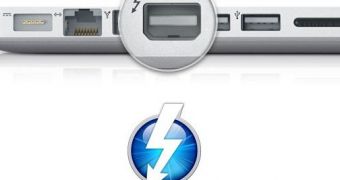Up until a few days ago, Intel's LightPeak data transfer technology seemed to be a technology that was still in development stages, far from having reached maturity, but it seems that this wasn't at all the case, since it's just made its official debut in one of the best-known portable computing systems out there, the Apple MacBook Pro.
From what we've been able to see up until now, the Thunderbolt technology, formerly known as LightPeak, is capable of providing quite an impressive data throughput, of around 10 Gbps, which is actually twice as fast as USB 3.0. Moreover, beside PCI Express protocols, Thunderbolt also supports DisplayPort devices, meaning that users can also easily employ it in order to output video to compatible displays (and there's an increasingly higher number of such products available on the market).
Plus, much in the same way as Universal Serial Bus solutions, the new Thunderbolt also supports power over cable for bus-powered devices.
One of the few problems Thunderbolt might face on the long-run is related to the number of companies that will decide to adopt it (the technology requires a controller chipset by Intel and a proprietary connector).
However, we'd dare to say that Intel's chose a pretty good moment to go official with the LightPeak/Thunderbolt technology, given the fact that USB 3.0 is still rather far away from mainstream status, especially due to Intel's reluctance of providing native SuperSpeed support within its motherboard chipsets.
Of course, only time will tell just how many motherboard, systems and accessories' manufacturers will adopt this standard, but given it extensive level of compatibility with DisplayPort solutions (already more and more popular), we're actually willing to bet that Thunderbolt will really manage to become mainstream quite rapidly.
Sure, it's a little early to say whether it will manage to replace USB 3.0 or they will co-habit the same market space, but without a doubt, Thunderbolt is here to stay, and will surely make a bang over the next couple of months.

 14 DAY TRIAL //
14 DAY TRIAL //